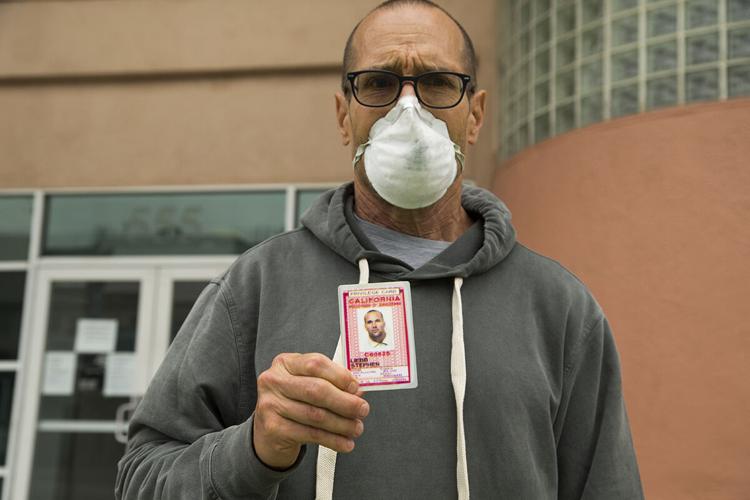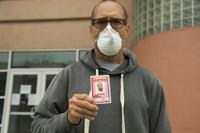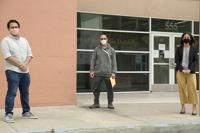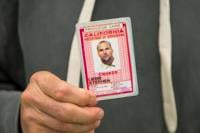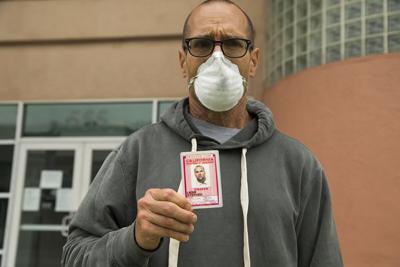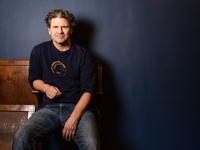Up until late June, San Quentin — the oldest prison in California — had managed to dodge the COVID-19 pandemic.
But a transfer of 121 men from a state prison in Chino — many of whom were exhibiting symptoms — changed that. Once inside the Marin County correctional facility, the virus spread like wildfire. Today, nearly 1,200 of those incarcerated at San Quentin have been diagnosed with COVID-19, and 12 have died.
Even before the outbreak began making headlines, activists were calling for the prison to reduce its population to prevent the risk of spread. San Quentin has more than 3,000 inmates, which is 25 percent more than what the prison is designed to hold. Over the past month, efforts have ramped up to free prisoners from the virus-racked prison, a lengthy process that can take years.
One lawyer on the frontlines of this effort has a unique perspective: Stephen Liebb, a paralegal with the San Francisco Public Defender’s office, spent 33 years behind bars for first degree murder. Nineteen of those years were spent in San Quentin. He was released on parole in 2013. At 63, Liebb now spends his days working to get people out of the prison where he spent nearly two decades of his life.
“I’m so grateful not to be there right now,” he tells SF Weekly. “If I were in there, I would want someone going all out for me. The letters I get from family members are heartbreaking. Everyone in the San Francisco Public Defender’s office is doing whatever’s necessary to get them out.”

Stephen Liebb, center, a legal assistant with the SF Public Defender’s Office, stands with his Integrity Unit colleagues Zachary Dillon, left, and head attorney Danielle Harris outside the Public Defender’s Office on Monday, July 20, 2020. (Kevin N. Hume/S.F. Weekly)
Liebb was hired by Public Defender Jeff Adachi in 2018, but his experience in law goes back decades. He was a lawyer at the time of his arrest in the 1980s, and while incarcerated, helped his fellow prisoners file petitions and writ of habeas corpus, the latter of which could give people a chance to appear in court and challenge their detention.
“It was just a natural part of my existence there,” Liebb says. “I had the ability to help somebody. A lot of people didn’t have the language skills or the educational opportunities to disclose mistreatment. It was a collective effort with other convicts who wanted to challenge the system.”
Upon his parole in 2013, Liebb immediately returned to a career in law. The California Bar Association declined to reinstate his law license, so he took the notoriously tricky bar exam again in February 2016, while he was interning at the UC Hastings Center for Gender and Refugee Studies. He passed. Two years later he landed a job at the Public Defender’s office, where he works in the post-conviction unit.
The unit is small, but has a mighty task, especially in the wake of the outbreak at San Quentin. With the blessing of Public Defender Mano Raju, Liebb’s unit — led by Deputy Public Defender Danielle Harris — reached out to 60 detainees in San Quentin, offering to help them with their release. The response was huge, and with that green light, the paperwork began.
“The legal mechanism is pretty straightforward,” explains Liebb. “We’re using a method called Penal Code 1170 d. What needs to happen here is assembling the evidence that a client has undergone a transformation, has accepted responsibility, is accountable for his past, explored the roots of it, and addressed it. That’s essential.”
Without that evidence, the District Attorney won’t recommend resentencing, and the judge won’t sign off on it. But beyond that, detainees have to have proof they can successfully be reintegrated into the community, which includes access to housing, mental health care, substance use treatment, and a support network.
As the numbers of COVID-19-positive cases rose, lawyers from other areas of the Public Defender’s office hopped on board.
“We have lawyers who’ve never filed a habeas petition or an 1170 d stepping up and volunteering to take these cases,” Liebb says. “When we’re ready to have a case submitted, there’s a lawyer willing to take that case and do the paperwork. It’s really uplifting. It’s amazing to see. There’s no shortage of people willing to help.”
At the same time, the California Department of Corrections and Rehabilitation is freeing up time to help. Liebb says the litigation coordinators in San Quentin are providing him with the records of incarcerated people in a matter of days, when normally it takes months.
For Liebb the work is empowering, but also deeply personal. He still knows people inside San Quentin, and he worries about the conditions of the facility.

Stephen Liebb, a legal assistant with the SF Public Defender’s Office, holds his identification card from when he was incarcerated at San Quentin Prison on Monday, July 20, 2020. (Kevin N. Hume/S.F. Weekly)
“In the dormitory you have one bunk on top and another, and rows of bunks feet away from each other,” he says. “It’s impossible to practice social distancing. You have hundreds of inmates sharing a few showerheads and toilet facilities. It’s a breeding ground for not just COVID but all diseases.”
But even in the cell blocks, where two men share a bunk bed, there’s no ventilation. “The buildings are known to have asbestos and black mold,” Liebb says. “All that goes through that building, it’s recycled air that goes from one cell to another. We don’t have windows with a flow of fresh air.”
And the food is, predictably, terrible. Liebb spent years working in the kitchen, where he says they’d regularly run out of disinfectant and plastic cloves. The factory-purchased food is low in nutrition. It’s tough on morale, and even tougher on one’s health.
“This is harder than anything we went through; riots, lockdowns, being in the hole,” he says. “If your body’s strong and your mind’s strong you can survive anything. But if there’s something that’s in the air there’s no way to protect against it.”
The efforts of the Public Defender’s office provides some people inside a chance at release, and that alone can keep one’s morale up. Seeing Liebb start to appear in news stories and on TV helps, too.
“What I heard from homies in there is that just seeing a news story on what we’re doing, and seeing me in it, gave hope,” he says.
His personal experience being incarcerated adds to the diversity of the Public Defender’s office. “We are so fortunate to have someone in the office with the wisdom and insight that Steph brings,” says Public Defender Mano Raju. “From his incarcerated years, he has a firsthand awareness of the inhumanity of the criminal legal system and life behind bars. It fuels within him a fire for justice that really never stops burning.”
As for Liebb, he’s found his life’s work, after more than three decades in prison.
“No one ever wants to be defined by their very worst action,” he says. “A lot of us who were formerly incarcerated committed wrongdoings. The work I’m doing is a form of making amends. I think to deny anybody living the capacity to change and grow is to deny life. Anything living is always changing, and there are a lot of people in San Quentin that have been more than ready to come home and contribute to the community. We have a lot of people in prison who could edify our community.”


